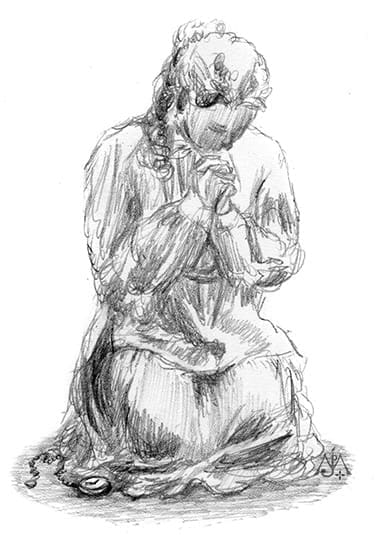‘Everything is a grace’
By LORRAINE V. MURRAY, Commentary | Published July 14, 2020
It was early morning when I saw a friend who lives nearby walking up the path. “I was saying my morning prayers,” he said, “and thought I’d stop by.”
He and his wife are broken-hearted, ever since their teenage daughter abruptly moved out. As he struggles to accept this, he talked about God’s plan for our lives, and how it can drastically differ from our own designs.
He mentioned a woman whose newborn baby had a dangerous temperature spike. The mother helped the nurses put cold packs on the baby, who was suffering and looked at the mother as if to say, “Why are you doing this to me?”
The infant girl couldn’t understand that the mother had her best interests at heart. “People are like that too,” my friend said. “We look at God and ask him why he is allowing us to suffer.”
 St. Therese of Lisieux battled tuberculosis during a time when there was little medical relief from pain, and she died in agony at age 24.
St. Therese of Lisieux battled tuberculosis during a time when there was little medical relief from pain, and she died in agony at age 24.
Still, she had written, “Everything is a grace, everything is the direct effect of our Father’s love, difficulties, contradictions, humiliations, all the soul’s miseries … because through them she learns humility, realizes her weakness. Everything is a grace because everything is God’s gift.”
But what about the world now? In many ways, it seems life as we once lived it has been shattered. Where is the gift? Where is the grace?
We have the ongoing worry of the pandemic, along with the huge number of people unemployed, plus social unrest. The headlines go from one disaster to another, and it’s easy to think God has put the world on hold.
“When our whole system of security falls apart, there remains either terrible despair or heroic faith,” writes Father Tadeusz Dajczer in “The Gift of Faith.”
Heroic faith means abandoning ourselves to God’s will, even when it clashes with our earthly plans. The crumbling of our usual support systems opens us to God’s grace. “You cannot rely on anything but God.”
Hasn’t this been true since the outbreak of the pandemic? Suddenly, our regular patterns of life were broken. People no longer worked in their offices, children no longer went to school, churches no longer had public Masses.
We had to ponder God’s mysterious will for our lives. We had planned to attend services during Holy Week but couldn’t. We had hoped to be in church on Easter Sunday, but we weren’t.
We wanted to take a vacation, but that was no longer feasible. We were relying on a certain salary, but for many people, financial security was gone.
“God must contrive to break through those routines of ours and remind us … that we are ultimately dependent only upon him,” writes Father Walter Ciszek in “He Leadeth Me.”
We often fail to see God in the comfortable routines of everyday life. Then something happens that throws our world out of orbit—and we turn to God. As Oscar Wilde wrote, “How else but through a broken heart does Lord Christ enter in?”
For me, the breakdown of routines has been agonizing since my life for three decades was lived in tandem with my husband. His death uprooted my security and my dreams for the future.
The world changes radically when someone we love dies—and the world has changed radically for human beings everywhere, since the pandemic hit.
We will get through it with God’s help. We will never be the same, but that’s not a bad thing.
“Everything is a grace” means that even heart-breaking tragedies play a part in our salvation. Just like the newborn baby and her mother, we might ask God, “Why are you doing this to us?”
But life isn’t a math problem, so there isn’t an answer for every question. We trust that everything, even loss and upheaval, is part of God’s loving plan. And let’s pray that Jesus will heal our troubled world and gently enter every broken heart.
Sketch (“The Petition”) is by Lorraine’s late husband, Jef. Her email address is lorrainevmurray@yahoo.com.